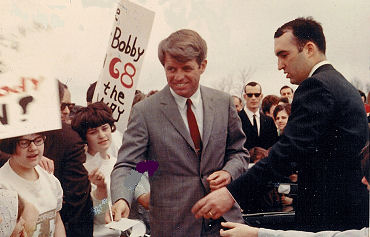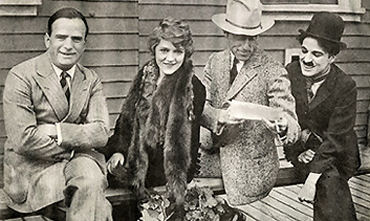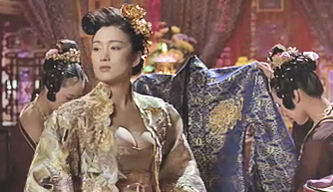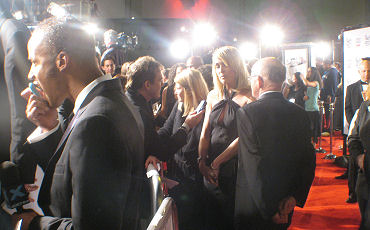In his just-released Volver (Sony Classics), director-writer Pedro Almodovar “acknowledges misfortune — and takes it seriously — from a perspective that is essentially comic,” says N.Y. Times critic A.O. Scott. “Very few filmmakers have managed to smile so convincingly in the face of misery and fatality: Jean Renoir and Billy Wilder come immediately to mind, and Mr. Almodovar, if he is not yet their equal, surely belongs in their company.
“Volver is often dazzling in its artifice — Jose Luis Alcaine‘s ripe cinematography, Alberto Iglesias’s suave, heart-tugging score — but it is never false. It draws you in, invites you to linger and makes you eager to return. It offers something better than realism. The real world, after all, is where we all have to live; for some of us, though, Mr. Almodovar’s world is home.”
Admirations pledged to star Penelope Cruz and costar Carmen Maura are nothing to sneer at either:
With her Volver performance Cruz “inscribes her name near the top of any credible list of present-day flesh-and-blood screen goddesses, in no small part because she manages to be earthy, unpretentious and a little vulgar without shedding an ounce of her natural glamour.
“What’s more, Almodovar has cast Maura, one of the stars of his early, madcap period, as Raimunda’s mother, who seems to have returned from the dead to add a touch of the gothic (and the surreal) to the proceedings . Maura’s warm good humor is a crucial element in the film’s emotional design. It is a chronicle, mostly, of tragedy and horror, rendered in bright, happy colors.”
wired
Mistake on “Borat”?
A reader who works out of a Morgan Stanley office in Westchester County wrote the following this morning: “I’m no expert but I think 20th Century Fox made a big, big mistake in not giving Borat a wide release this weekend.” [Editor’s note: Fox had it scheduled to go out semi-wide but then got the heebie-jeebies and cut the exposure by 800 screens.] “I work in an open office and everyone is aware of it to the point that people may be skipping out to check an early show if they can find one.
“It looks to me like a blockbuster, in short, and what are these producers going to do when half the world wants to see it and can’t this weekend? Then the word-of-mouth will die down and what could have been a $25 or $30 million weekend will end up being $15 million or thereabouts.
“I could get to a show with a little effort since it’s playing in Manhattan and nearby. That’s not really my point. I just think that they are misjudging the output they would have gotten this weekend. Sacha Baron Cohen has obviously tapped into something that appeals to Roger Ebert i.e., the intellectual joke) plus the Jackass types that like slapstick. If you have something with that wide an appeal, why put in the governor by giving it a limited release?
“I know enough about movies that I will most likely see it at some point, and then buy the DVD on pre-sale, because it seems especially funny. If a movie is that good and that appealing, its just stupidity not to release it wide. There’s a big difference between ‘Hey, let’s go see that new Borat movie/” and ‘What was that movie that people were going nuts over a couple weeks ago? Didn’t it get great reviews?'”
“It might be big enough to get over the limited release, but with all this good press I would be kicking myself if I was one of the Fox distribution people.”
Why I was absent
Two or three hours this morning talking to people about poor Adrienne Shelly, and then four and a half hours trying to re-launch my SAM broadcaster software to it funnels into my server so I can get into the occasional podcast thing again. Exasperating! But at least it’s done and the ordeal’s ever.
Oscar cred = box-office cred
Does the box-office popularity of a film have much to do with its chance of being nominated for a Best Picture Oscar? Obviously yeah…it does. A movie that has shown itself to be a modest little-engine-that-could success can be nominated, and obviously being a huge success doesn’t hurt a bit, but a film that stiffs on opening weekend is pretty much dead in the water. Hollywood Wiretap‘s Pete Hammond looks at the winners and losers so far, according to this equation:
“The Departed‘s box-office cume “is near $100 million, and now the story goes if it gets to $150 million it could win the Best Picture Oscar. Before [it] opened to big numbers no one was saying that,” he observes. “Conversely this week many pundits immediately wrote off the chances of Focus Features well-reviewed apartheid drama Catch A Fire after a dismal $2 million dollar opening in over 1300 theatres.
“The same company’s other award hopeful, the September entry Hollywoodland also ‘underperformed’. You can see it now at the $3 house on Fairfax and Beverly.
“To its credit, Focus is undeterred and continues to support both films particularly in acting categories. Full page ‘For Your Consideration’ ads appeared in the L.A. Times Envelope newspaper supplement Wednesday and casts of both films are still busily promoting the movies on the q & a circuit. Keeping these kind of contenders alive as their presence in theatres fades becomes the key challenge.
“There were also media storm clouds forming over the Clint Eastwood war epic Flags Of Our Fathers this week, at least according to those same pundits who claim its less-than-boffo b.o. take will cost the former ‘sure thing’ a slot in the Best Picture race.
“The Last King Of Scotland is another contender slow to go at the b.o. Will its modest bounty be enough to land Forest Whitaker a nod? And what about the critically acclaimed, relatively little-seen Little Children? We naively thought/hoped awards were supposed to be about artistic achievement but, in the minds of many, the Academy is really just a microcosm of the ticket-buying public.”
Kidman blows off “Fur”
Reactions to and explanations why Nicole Kidman has blown off promotional appearances on behalf of Fur (Picturehouse, 11.10), which, let’s face it, is probably dead anyway no matter what anybody says or does.
Kennedy’s violence speech
The most moving thing in Bobby is a recording of Robert Kennedy speaking about the pernicious effect of violence in our culture. It’s heard at the very end of the film. He gave this short speech on April 5, 1968 — one day after he delivered his famous impromptu remarks to a crowd shortly after the death of Martin Luther King was reported, and 29 days before he met his own end from an assassin’s bullet at the Ambassador Hotel.

“It is not a day for politics. I have saved this one opportunity, my only event of today, to speak briefly to you about the mindless menace of violence in America which again stains our land and every one of our lives.
“It is not the concern of any one race. The victims of the violence are black and white, rich and poor, young and old, famous and unknown. They are, most important of all, human beings whom other human beings loved and needed. No one — no matter where he lives or what he does — can be certain who will suffer from some senseless act of bloodshed. And yet it goes on and on and on in this country of ours.
“Why? What has violence ever accomplished? What has it ever created?
“Whenever any American’s life is taken by another American unnecessarily — whether it is done in the name of the law or in the defiance of the law, by one man or by a gang, in cold blood or in passion, in an attack of violence or in response to violence — whenever we tear at the fabric our lives which another man has painfully and clumsily woven for himself and his children, whenever we do this the whole nation is degraded.
“Too often we honor swagger and bluster and wielders of force; too often we excuse those who are willing to build their own lives on the shattered dreams of other human beings. Some Americans who preach non-violence abroad fail to practice it here at home. Some who accuse others of inciting riots have by their own conduct invited them.
“But this much is clear: violence breeds violence, repression brings retaliation, and only a cleansing of our whole society can remove this sickness from our souls.
“When you teach a man to hate and fear his brother, when you teach that he is a lesser man because of his color or his beliefs or the policies that he pursues, when you teach that those who differ from you threaten your freedom or your job or your home or your family, then you also learn to confront others not as fellow citizens but as enemies, to be met not with cooperation but with conquest; to be subjugated and to be mastered.

“We learn, at the last, to look at our brothers as aliens, alien men with whom we share a city, but not a community; men bound to us in common dwelling, but not in a common effort. We learn to share only a common fear, only a common desire to retreat from each other, only a common impulse to meet disagreement with force.
“Our lives on this planet are too short and the work to be done too great to let this spirit flourish any longer in this land of ours. Of course we cannot vanquish it with a program, nor with a resolution. But we can perhaps remember, if only for a time, that those who live with us are our brothers, that they share with us the same short moment of life; that they seek, as do we, nothing but the chance to live out their lives in purpose and in happiness, winning what satisfaction and fulfillment that they can.
“Surely, this bond of common faith, this bond of common goals, can begin to teach us something. Surely, we can learn, at the least, to look at those around us of our fellow men, and surely we can begin to work a little harder to bind up the wounds among us and to become in our own hearts brothers and countrymen once again.”
I tried to get a sound file of this speech from the Weinstein Co. publicity, but they didn’t have one to give me. If I were marketing this film I would make dead sure to issue a recording of this speech to every thoughtful-minded website in the world so it could be downloaded by millions and considered and absorbed. This speech sells the intended spirit of Bobby better than anything I’ve seen, heard or read from any source.
Lohan vs. Sloan Zelnick
A friend was standing near Bobby costar Lindsay Lohan after she’d finished doing her on-camera interviews with E.T.‘s Jan Craft and the other Stepford Showbiz News ladies outside the Mann Chinese. What my friend overheard was somewhere between mildly amusing and “telling” — a mini-Eugene O’Neill drama played out in the space of two lines of dialogue and one bit of physical business.

Lindsay Lohan talking to E.T.‘s Jan Craft — Wednesday, 11.1.06, 7:26 pm
Several fans were yelling “Lindsay! Lindsay!” Lohan was aroused and moved to respond. “Oh, I have to go over and talk to my fans!” she said to Leslie Sloane Zelnick, her publicist who became (in)famous last summer for trying to explain away Lohan’s not showing up for work on Georgia Rule as a case of “heat exhustion.” But Sloane wouldn’t allow it “We don’t have any time [for that] and they’re not paying for the movie tonight,” she told Lohan.
Lohan didn’t respond except to give her publicist “a blank stare”, as if to say “What is your problem?” In response to this very slight act of defiance Sloane Zelnick “yanked her” toward the theatre, my friend says. Yanked her? If true (and I trust my source), this obviously implies a kind of strict mom-undisciplined daughter relationship between the two, which, to be fair, may be Sloane’s attempt at filling a gap left by Lohan’s mother Dina, who’s known the world over for not exactly being the responsilble-parent type.

Lohan rep Ruth Bernstein — Wednesday, 11.1.06, 7:40 pm — at Bobby premiere.
“Bobby” again
I saw a slightly shorter version of Bobby (Weinstein Co., 11.17) at the AFI Film Festival premiere last night. Shorter by maybe ten minutes, but it hasn’t made that much difference. This is a fairly square, somewhat old-fashioned film trying to do the right, heartfelt, semi-poignant thing with the legend of Bobby Kennedy , and either you can roll with this sort of thing or you can’t. I talked to a lot of people at the after-party who felt favorably disposed, so don’t take my view as the final word.
I wasn’t that underwhelmed by it. I still feel that it’s more Love Boat ’68 than Grand Hotel, which is the model that Estevez was trying to emulate when he wrote it. It’s the best-crafted film Estevez has yet made, if that’s not, you know, damning with faint praise. I didn’t hate it. It’s an okay thing for what it is.
I said it the best with this Toronto Film Festival dispatch: “If you can sit back and go with the fact that Estvez is going to try and make you feel the allure of Kennedy’s Presidential primary campaign as well as the terrible shock of his murder on the night of June 4, 1968, by making you feel how it was to be an average person muddling through in ’68, and that Estevez will try for this immersion by showing you a series of Love Boat relationship stories — and I mean stories and situations that do nothing to illuminate or inform anyone about Kennedy or his ideals…if you can kick back and say, “Okay, I can roll with this…I’m ready to accept the banality of this approach,” then Bobby isn’t half bad.
And this one: “Archival footage of Kennedy is basically what saves it, along with a recording of an eloquent and very moving speech that he gave about the persistent presence of violence in American life. Despite the best of intentions and the worst of consequences, Bobby fails to undermine the actual Kennedy mystique. There’s a lingering potency to the RFK legend — who he was, what he said, the metaphor of his life and how it ended.”
The intrigue in the above photo, by the way, isn’t Sharon Stone, whose expression suggests that the blond-haired interviewer with the battery-operated recording device has just asked her something inane and she’s debating whether or not to give him a sincere reply or goof on it. The focus is the guy on the left spraying the breath spray.
The after-party at the Hollywood Roosevelt hotel was superb in every respect. Poolside locale, scrumptious food, good people, not too crowded.
Geezer rockers
Does raunchy, power-chord rock music kick and wail no matter how old the performers, the audience and the guy shooting the concert documentary are? Screw the calendar — rock is a state of mind. But there’s something creepy about grey-haired, turkey-necked, pot-bellied rock musicians getting down on-stage with a sea of AARP fans stompin’ and hootin’ and whatnot. There’s something just “not right” about this.
Part of the solution (and I know this sounds shallow) lies in dieting, daily workouts, hair dyes and face-lifts. You’ve got to try and look the part of a rocker or a rock- music fan, and by that I mean a person who doesn’t look too sedate or retiring or anesthetized by too much wealth or food. Someone with a passing acquaintance with the biological vitality of life…who takes walks, gets around, owns a bicy- cle and is out there plugging, etc. Someone who doesn’t look like an escapee from a managed-care facility.
The only older rocker who hasn’t creeped me out is Mick Jagger, who was fantastic when he gave a brief live show at L.A.’s El Rey theatre in ’01 — rail-thin and dark-haired and throttling the entire room with the energy of a 20 year-old. (His performance of “God Gave Me Everything (I Want)” was legendary.) I’m asking this because a few days ago Martin Scorsese, 64, shot a Rolling Stones concert at Manhattan’s Beacon Theatre with Jagger, 63 and Keith Richards, 62, blasting away and Bill Clinton, celebrating his 60th birthday, hootin’ and yellin’ in the orchestra.
Bottom line: rock out in the privacy of your own home (or inside your IPod earphones) until you’re dead, but rock is a young person’s game and there’s just something not cool about rocking out in public if you don’t exude at least a semblance of the elan of youth. I think that’s putting it fairly…no? Roger Daltry, cool. David Crosby…liposuction.
Loathing talking animals
Loathing of corporate-formulaic animated talking-animal movies is building, building…a very healthy development. It basically means that even compassionate people of moderate dispositions have a breaking point and that those who maneuver and profit within the quiet corridors of power need to listen up. I cite two examples as proof:

(a) On 9.19, I printed the exasperated comment of a hard-working director (initially conveyed to his manager-producer), to wit: “If I see one more bus ad for one more fucking animated movie with fucking animals in it, I’m going to start screaming.”
(b) Now it’s 11.2 and MSNBC’s Dave White is ranting about essentially the same thing. “Why weren’t Antz and A Bug’s Life enough? Why did we need Ant Bully too? Were there not enough ant-centric films on the pop culture landscape? Did all the DVDs of those other two movies turn to dust, creating an aesthetic void? Why did Doogal get made? What was it even supposed to be about? Why was Jon Stewart a talking coiled spring? Why would I rather watch someone get beheaded on the internet than sit through another one of these stupid, cheap, insulting, corporate toy commercials? When will the eyeball-scorching awfulness end?”
Cruise-Wagner takes over UA
“Studio management by creative talent” was the idea when Douglas Fairbanks, Charlie Chaplin, Mary Pickford and D.W. Griffith formed the old United Artists on 2.5.19, and now the same deal is in effect with today’s announcement that Tom Cruise and Paula Wagner are taking over UA and running the creative-greenlight side of the business “subject to certain parameters,” with the partnership and support of MGM chariman and CEO Harry E. Sloan.


Tom Cruise, Paula Wagner; MGM CEO Harry E. Sloan
Crazy Tom, Crazy Harry and Paula Wagner! This is definitely a Cruise + Wagner rebound that eliminates all the spiritual residue of Sumner Redstone‘s harsh decision to boot their production company off the Paramount lot last summer (especially with the story being recounted in the December Vanity Fair), and a nice little maneuver by Sloan that makes UA sexy again. But we’d all like to know more details.
Wagner “will serve as Chief Executive Officer of United Artists, overseeing the day to day operations of the studio alongside her longstanding producing partner Cruise, who will star in as well as produce films for United Artists and also be available to appear in film projects for other studios,” the release says.
How many films per year will the new United Artists be looking to produce? What are the financial parameters? Will they be acquiring at all? Cruise’s fame and box-office potency is obviously the fulcrum of the deal, but the last eighteen months have made it clear to everyone that his currency has been devalued. But there’s opportunity that comes with this. One game ends, another begins.

“Flower” Oscar campaigns
Sony Pictures Classics’ Michael Barker and Tom Bernard are so taken with a recently viewed final cut of Curse of the Golden Flower (opening 12.22) that they’ve decided to launch Oscar campaigns for the two principal talents — star Gong Li for Best Actress, and helmer Zhang Yimou for Best Director.

Flower reunites these legends of modern Chinese cinema for the first time since the mid ’90s following their collaboration on films such as Red Sorghum, Raise the Red Lantern, To Live and Shanghai Triad (all but one made during their passionate and very public extra-marital love affair that lasted about six years). “They’re now working together at their peak of their talents,” Barker has told The Envelope’s Tom O’Neil. “They’ve created a film of great dramatic tension and visual splen- dor…we’re really excited.”

